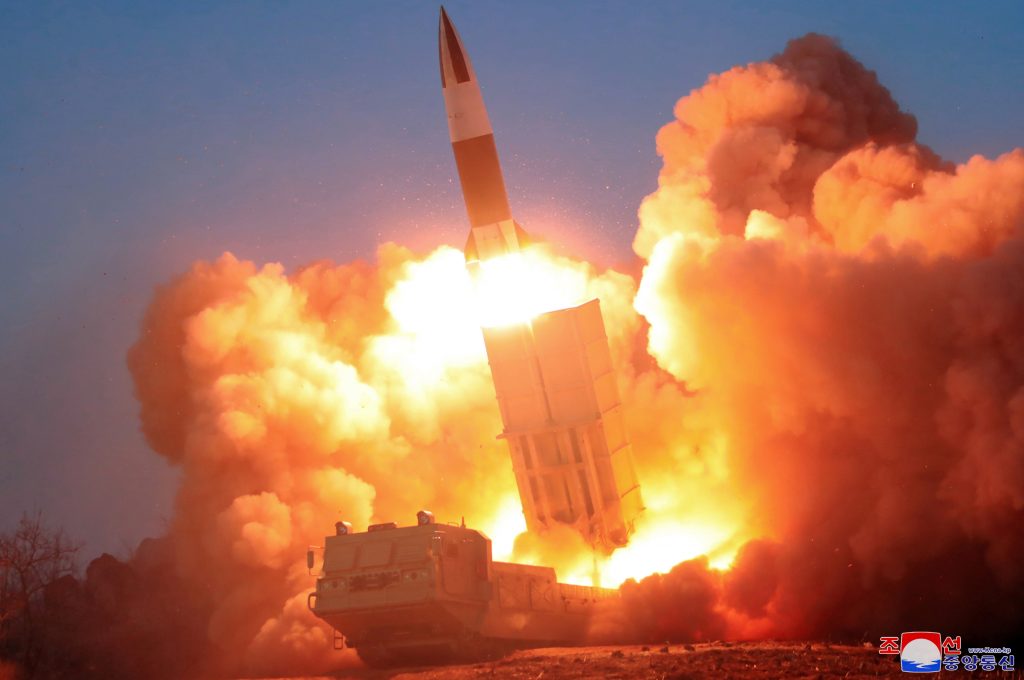 |
| FILE PHOTO: A suspected missile is fired, in this image released by North Korea’s Korean Central News Agency |
North Korea launched a suspected missile that appeared to explode shortly after liftoff in the skies over Pyongyang on Wednesday, South Korea’s military said, amid reports that the nuclear-armed North was seeking to test-fire its largest missile yet.
The United States and South Korea have warned that North Korea may be preparing to launch an intercontinental ballistic missile (ICBM) at full range for the first time since 2017, in violation of United Nations Security Council (UNSC) resolutions.
The projectile was fired from Sunan Airport outside the North Korean capital of Pyongyang, South Korea’s Joint Chiefs of Staff (JCS) said in a statement.
“It is presumed that it failed immediately after launch,” the statement said. It was presumed to be a ballistic missile and seemed to explode in mid-air while still in its booster phase, at an altitude of below 20 kilometres (12 miles), a JCS official told Reuters.
A U.S. military’s Indo-Pacific Command statement called it a “ballistic missile launch.” The command did not mention the reported failure, but condemned the launch and urged Pyongyang to refrain from further destabilising acts.
A U.S. Department of State spokesperson also condemned the launch as a violation of UNSC resolutions that ban North Korea’s ballistic missiles, but declined to comment when asked about the reported failure.
Debris fell in or near Pyongyang after the failed test, Seoul-based NK News reported, citing unnamed witnesses and a photograph of the test showing a red-tinted ball of smoke at the end of a zig-zagging plume that traced the rocket’s launch trajectory in the sky above the city.
The failed launch underscored the danger behind North Korea’s decision to use the airport as a major site for test firing large missiles, analysts said.
“The report of a failure from Sunan is concerning because of the possibility of damage to heavily populated civilian areas,” said Ankit Panda, a senior fellow at the U.S.-based Carnegie Endowment for International Peace.
In 2017, an intermediate-range ballistic missile launched from another location in North Korea failed shortly after liftoff and crashed into an industrial or agriculture complex in the city of Tokchon.
The Sunan airport has been the site of several recent launches, including on Feb. 27 and March 5. North Korea said those tests were for developing components of a reconnaissance satellite and did not identify what rocket it used, but Seoul and Washington said they were tests of a new ICBM system.
SERIES OF NEW MISSILE TESTS
Reclusive North Korea has fired missiles at an unprecedented frequency this year, conducting its ninth weapons test on March 5, drawing condemnation from the United States, South Korea and Japan. Read full story
The USS Abraham Lincoln aircraft carrier led military exercises in the Yellow Sea, and air defence artillery at Osan air base in South Korea intensified drills in response to the increased North Korean missile activity, U.S. forces in Asia said on Tuesday.
The new ICBM system, the Hwasong-17, was unveiled at a military parade in 2020 and reappeared at a defence exhibition in October 2021.
The Feb. 27 and March 5 launches did not demonstrate the missile’s full range, and analysts said the North might have used only one stage of the missile or adjusted its fuel volume to fly at lower altitudes.
The Hwasong-17 would be North Korea’s largest ICBM yet, and the government appears to be restoring some tunnels at its shuttered nuclear test site, U.S. and South Korean officials said last week.
North Korea has not tested an ICBM or nuclear bomb since 2017, but has said that it could resume such testing because denuclearisation talks with the United States are stalled.
REGIONAL RESPONSE
U.S. National Security Adviser Jake Sullivan and China’s top diplomat Yang Jiechi discussed North Korea in Rome on Monday during talks that focused on Ukraine.
The official said Washington had “serious concerns about the recent escalatory actions” by North Korea and Sullivan made clear to Yang the steps that the United States believed needed to be taken.
Last week, the United States and 10 other countries bemoaned the failure of the U.N. Security Council – where China has veto power – to condemn North Korea’s repeated missile launches, saying this eroded the credibility of the council and the global non-proliferation regime.
Washington imposed fresh North Korea-related sanctions on Friday, targeting Russian individuals and companies after the two recent launches.
Russia and China, which backed U.N. sanctions after North Korea’s last ICBM and nuclear tests in 2017, have since argued that sanctions should be eased to encourage dialogue.
REUTERS
